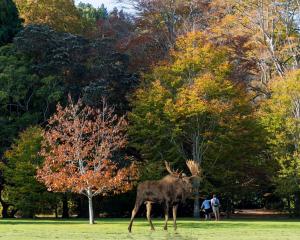Film Otago Southland executive manager Kevin Jennings, of Queenstown, said yesterday's announcement film-maker James Cameron would invest $500 million to produce the next three Avatar movies here was ''great news'' for the domestic film industry.
Mr Jennings believes the decision ''came off the back'' of the Government's increase in incentives to encourage more international productions and offer more financial assistance for mid-budget level New Zealand productions, which was also announced yesterday.
What Avatar could mean for the Southern film industry, the third largest after Auckland and Wellington, depended on how the trilogy was going to be shot between studios and locations.
The Otago Southland Film Office has not been contacted by Cameron's production team so far.
''The opportunity probably lies in background shots and while production probably won't be based here, it will mean jobs for the industry, including Otago and Southland crew,'' Mr Jennings said.
Employment and skills opportunities for New Zealanders, including head of department roles, were pledged in the memorandum of understanding signed by the Government, Lightstorm Entertainment and Twentieth Century Fox Film Corporation.
About 90% of the live action crew members are expected to be New Zealanders and an internship programme will be included in the production of the next three films, due for release at Christmas 2016, 2017 and 2018.
The first Avatar (2009) movie was shot on location in the rainforests of Hawaii, in Los Angeles studios and Stone St Studios, Wellington.
Mr Jennings said there was ''an incredibly diverse choice of locations'' for Cameron to consider using in Otago and Southland, ''from lush temperate rainforests and snow-capped mountains and glaciers to arid badlands, all with great access and all in close proximity to tourism infrastructure which can handle the influx of huge crews''.
Otago has a track record in big-budget feature film productions - its scenery features in The Hobbit trilogy, X-Men Origins: Wolverine, 10,000 BC, The Lord of the Rings, The Lion the Witch and the Wardrobe, Prince Caspian and Vertical Limit.
''Benefits are immediate, with massive injections of cash into our economy through the likes of business infrastructure, materials, accommodation, bars and restaurants. Then there's two-fold exposure, for film tourism and our ability to deliver the goods for the film industry,'' Mr Jennings said.
Prime Minister John Key and ministers announced the rebate on international film and television productions will rise from 15% to 20%.
A further 5% will be available for international productions which deliver ''significant economic benefits'' to New Zealand.
Mr Jennings said New Zealand's previous incentive had not kept pace with the rising dollar.
There was growing competition from 44 states in the United States plus 28 countries which all offered producers some form of film incentive.
The new incentives ''put us back in the game for international productions and now we've got some great possibilities ahead,'' he said.
Film New Zealand chairman and producer Julian Grimmond, of Queenstown, said the incentives sent the strong message internationally New Zealand was competitive and the screen sector was backed by the New Zealand Government.
''When combined with New Zealand's reputation for talent, and some significant cost advantages, it makes a convincing argument for international production to come to New Zealand.''












